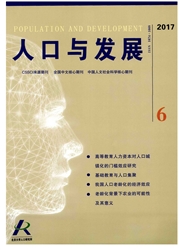

 中文摘要:
中文摘要:
利用2011年全国流动人口抽样调查数据,运用多元logistic回归分析模型,研究迁移模式对农民工重构人际网络的影响.迁移意愿在迁移模式影响人际网络的过程中起到显著作用;迁移距离和迁移规模对两个阶段人际网络都产生负影响,迁移时间对两个阶段人际网络都产生正影响;农民工在初级人际网络建立阶段群体差异不大,呈现“内卷性”群体特征,迁移距离和迁移时间都不显著,而在新型人际网络构建阶段群体差异显现,三种迁移模式均显著,构成新型人际网络差异性的重要原因;受教育程度、就业身份等显著影响人际网络的构建.
 英文摘要:
英文摘要:
By using the sampling survey data of national floating population in 2011 and utilizing the model of the muhinomial logistic regression, this paper analyzes the impact of migration patterns on the construction of interpersonal networks. The research results manifest that, firstly, the willingness to migrate plays a significant role in the process of affecting interpersonal networks by migration patterns;In addition, migration distance and migration scale both have a negative impact on the two stages of interpersonal networks, and the migration time has a positive influ ence on the two stages. Thirdly, there is little difference among the rural migrants in the con struction of primary interpersonal network, which presents" involution" in the group, and both distance and migration time is not significant;However, there are some differences among the group of rural migration in the construction of the new interpersonal network, all of the three mi gration patterns are significant, which is the main reason of the discrepancy of new interpersonal network. Fourthly, education degree, employment status and so on significantly affect the con struction of interpersonal networks.
 同期刊论文项目
同期刊论文项目
 同项目期刊论文
同项目期刊论文
 期刊信息
期刊信息
